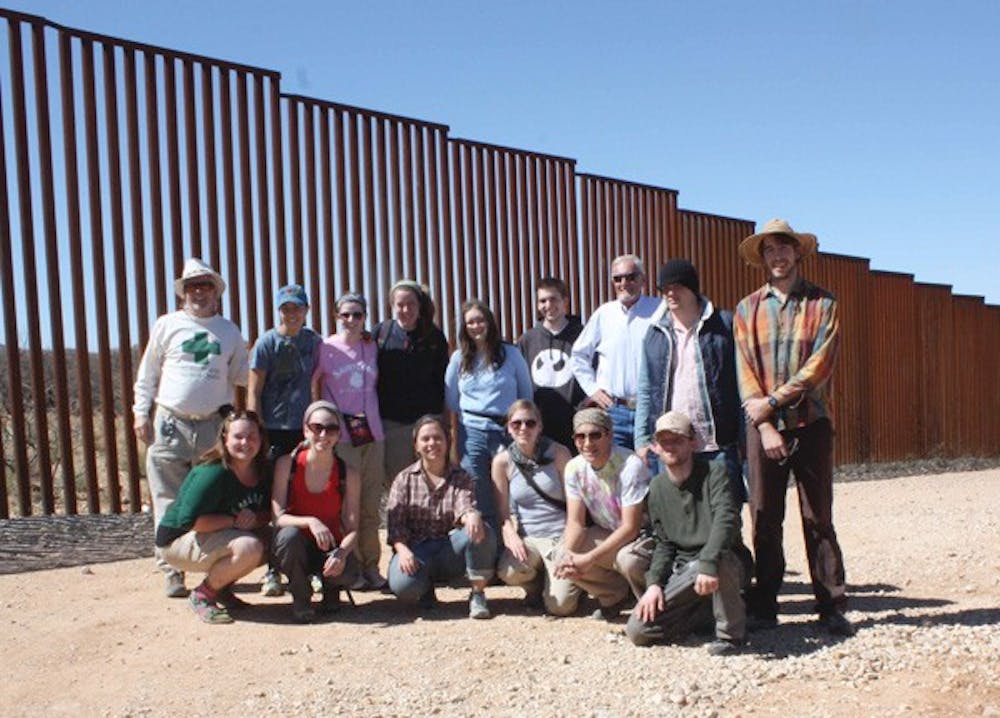Spring break wasn’t all about partying and traveling this year. For some students, it was a good opportunity to lend a helping hand.
Sociology junior Rafeal Veintimilla and seven other students volunteered with No Mas Muertes, or No More Deaths, a Tucson organization founded in 2004 in response to the high number of deaths of migrants crossing the U.S.-Mexico border.
The students spent the week learning about U.S. immigration policy and offering humanitarian aid to migrants in the Sonoran Desert.
No Mas Muertes provides aid for migrants crossing the border in addition to documenting abuse by border patrol agents. Aid stations run by the organization are located on both sides of the border.
The group also runs a special program for students during weekends, spring break and over the summer.
Veintimilla got involved with No Mas Muertes as a freshman. His passion for social justice and issues concerning immigration motivated him and other ASU students to take the alternative spring break trip.
Veintimilla said the organization does more than help migrants crossing the border.
“We also give aid to border patrol agents, hikers, hunters and anyone else who happens to be in the Sonoran Desert and is in need of assistance,” he said.
Biology senior David Baake made his second spring break trip with NMD this month and said it was an amazing week.
“ASU students, as citizens or residents of the United States, should know about the humanitarian catastrophe occurring along our southern border, not far from where we live and study,” he said.
The students first received medical training in Tucson on March 12 and learned about the history of the border’s migration problems at UA before driving to a No More Deaths retreat outside of Arivaca, Ariz., about 10 miles north of Mexico.
The group also visited the border wall and went to an orientation on the Sonoran Desert at the Buenos Aires Wildlife Refuge in southern Arizona, a high-traffic area for migrants. The remainder of the week was spent hiking, patrolling migrant trails and delivering food and water.
Baake said although nothing dangerous happened to the volunteers, being circled by U.S. Border Patrol helicopters while hiking was a new experience. He also got to climb to the top of the border wall, which took him 15 seconds.
“We did not really run into too many people who opposed our work,” he said. “The locals we interacted with were mostly very supportive.”
The group heard from border patrol agents at the wildlife refuge who told the students about migrants destroying habitats in the refuge land by driving cars through the area and leaving litter on the trails.
The most frustrating part of the trip for Veintimilla was watching captured migrants appear in court with very little counseling during a proceeding of “Operation Streamline,” a federal program that prosecutes illegal immigrants caught crossing the border. The group of students witnessed this proceeding in a Tucson courthouse.
“Some 60-plus migrants that had been caught throughout the week were sentenced within the course of about two hours,” he said.
Baake said all the migrants he interacted with while volunteering were friendly and respectful.
“They come here — risking death in the desert — because they want to feed their families back home,” he said. “It’s time to stop criminalizing people who are guilty of nothing but a desire to feed their families and share in the American dream.”
Despite being near the border for only a week, Veintimilla felt the group made a difference and there was hope that maltreatment of migrants will go away.
“My main concern is the amount of money that is going to border patrol and private prisons … [Migrants] will continue coming up, regardless what happens. There’s no real deterrence.”
Some of the students plan to meet again this semester and discuss future trips. Veintimilla said he plans to reach out to other clubs and departments to create an official campus-wide club.
Reach the reporter at naberra@asu.edu





